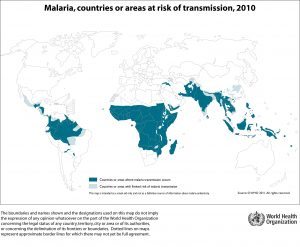Malaria is a mosquito-borne tropical disease, with symptoms such as a fever, a headache and, in more severe cases, a coma or even death. The risk of actually contracting malaria in areas that are affected is significant. In the UK alone, 1,500 travellers return with malaria each year. In 2014, there were 1,586 cases of malaria among UK-returning travellers, including three deaths.
What countries are at risk for malaria?
Malaria is a global problem. The WHO (World Health Organisation) estimates that there were 214 million cases globally with nearly half a million deaths in 2014.

Is there a vaccine?
There is no vaccine, but anti-malarial medications are available (with a prescription). Your IPSA Medical physician can provide you with the needed medication during your travel consultation and, unlike other travel clinics, we do not charge any fee for writing the prescription.
Travel precautions
There are ways to prevent contracting malaria when travelling to an at-risk area through the ABCD approach, which your physician will explain clearly to you during your consultation:
- Awareness of risk: Determine your risk of catching malaria.
- Bite prevention: You need to avoid mosquito bites when possible.
- Chemoprophylaxis: You should take the correct medication.
- Diagnosis: If you develop any symptoms, seek immediate medical help.
What are the signs and symptoms?
The typical malaria symptoms include shivering, a fever, pain in your joints, vomiting, convulsions and jaundice, with the classic malaria symptom being coldness followed by a fever/sweating.
With severe cases of malaria, progress of the disease is extremely rapid, inducing a coma or death within hours/days. Pregnant women and young children are especially vulnerable.
The prevention strategies
If you are travelling to an at-risk area, you should take anti-malarial medication to prevent the infection. To increase your safety, use mosquito repellent and nets.
Our clinic has a range of anti-malarial medications available, and your physician will determine the most suitable medication based on factors such as your destination, your family/medical history, current medications, pregnancy, age and any previous problems.
Being risk-aware is a key factor in terms of protecting yourself against malaria, so make sure to visit your IPSA Medical travel clinic when planning your trip.














 Opening hours
Opening hours